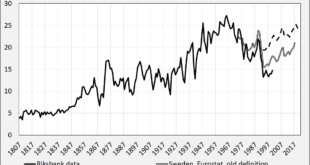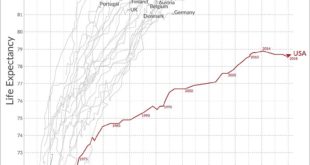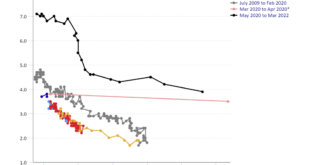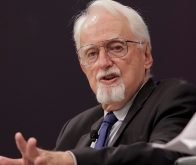Washington PostGreen EconomyThe Telegraph Hazel Henderson attacked economics as “politics in disguise” and demanded economists take account of quality of life. And for two decades she offered moral support for this blog and the Real-World Economic Review. “The paradigm of sustainability, with its notions of limitations and carrying capacities confronts dominant paradigms of progress which do not recognize limits to unchecked growth.”
Read More »Long term changes in the western rate of ‘Gross Fixed Capital Formation’. Patterns and anomalies.
In 2019, the Irish rate of ‘gross fixed capital formation’ (which I hitherto will call fixed investment), was 54,6%. More than half of total national expenditure… This was over twice the rate in most other European countries. And three times the Irish rate in 2011 or the Italian rate in 2014. What happened? Was this real? Were they building three times as many houses and roads, buying three times as many planes and trucks and doing three times as much Research and Development (which is...
Read More »The impediment to productivity growth: Waste that makes some people rich
from Dean Baker The New York Times ran a piece discussing why innovations in cloud computing and artificial technology have not led to more rapid increases in productivity. It raises a number of possibilities, but leaves out an obvious one, increasing waste associated with rent-seeking. We clearly see an increase in waste associated with rent-seeking, the only question is whether it is large enough to have a notable effect on productivity growth. The piece actually touches on, without...
Read More »Life expectancy vs. health expenditure
source
Read More »Great and rising inequality
from Jamie Morgan An interest in great inequality and rising inequality have become prominent features of our times. According to Oxfam in 2019 the 26 richest people on the planet had equivalent wealth to the 3.8 billion who comprise the lower 50% of the world population. The previous year it required the top 43 to create this equivalence. The 2020 Oxfam report adds a series of statistical claims: the world’s richest 1% have more than twice the wealth of 6.9 billion of the world’s...
Read More »Ethical criteria which hold the sustainability of life at their core
from Fernando García-Quero and Fernando López Castellano Overconfidence in the magical thinking of technification, economic growth, the free market, and neoliberal globalization has led many to forget that the state is the main policy architect and actor when facing a crisis. Successful responses to Covid-19 have shown, once again, the central role of states in organizing political measures that foster and maintain the welfare of their populations, through actions to guarantee quarantine,...
Read More »The Collapse of the India’s creative Industries
from Jayati Ghosh There is no doubt that creative industries, along with care activities, are going to emerge as some of the most significant economic sectors of the future. Broadly speaking, the creative industries consist of advertising, architecture, arts and crafts, design, fashion, film, video, photography, music, performing arts, publishing, research & development, software, computer games, electronic publishing, and TV/radio. A 2019 report from by UNCTAD (Creative Economy...
Read More »Beveridge Curves – Covid edition
Beveridge curves are graphical representations of the historical relationship between unemployment and the job openings/job vacancy rate. They should be called ‘Beveridge Ellipsoids‘ as they are banana shaped (an ellipsoid with one bent axis, aside of banana-shaped there does not seem to be an official name for such an ellipsoid). Just calling it a ‘curve’ is somewhat misleading as the banana-shape is no coincidence but caused by labor market dynamics: high unemployment leads to an...
Read More »Axel Leijonhufvud (1933-2022)
from Lars Syll The orthodox Keynesianism of the time did have a theoretical explanation for recessions and depressions. Proponents saw the economy as a self-regulating machine in which individual decisions typically lead to a situation of full employment and healthy growth. The primary reason for periods of recession and depression was because wages did not fall quickly enough. If wages could fall rapidly and extensively enough, then the economy would absorb the unemployed. Orthodox...
Read More »Thinking like an Economist?
from Peter Radford Thinking like an economist. What a horrible thought. Can you imagine anything more restrictive and less imaginative? It requires you to disengage from reality and enter a world constrained by absurd assumptions, odd definitions, and a lack of foundation. The entire edifice of economics sits, in all its glory, suspended in mid-air and relying on what the philosopher Daniel Dennett describes as “sky hooks” to hold it up. Beneath it is only vapor and foggy notions of...
Read More » Real-World Economics Review
Real-World Economics Review






